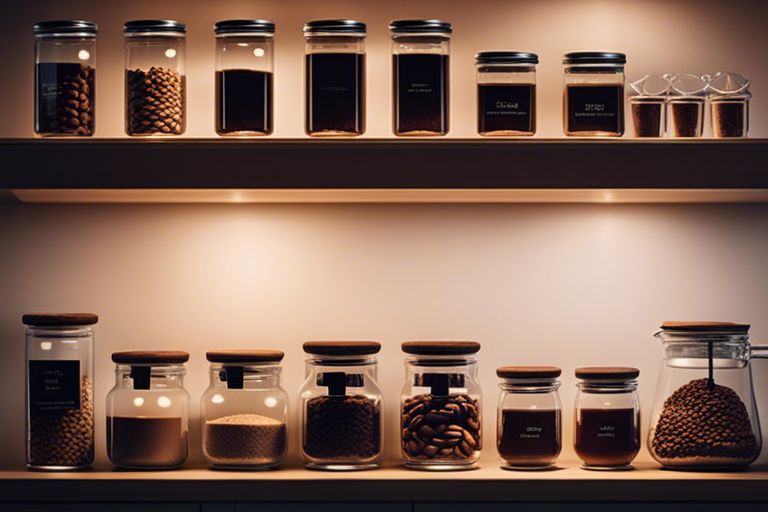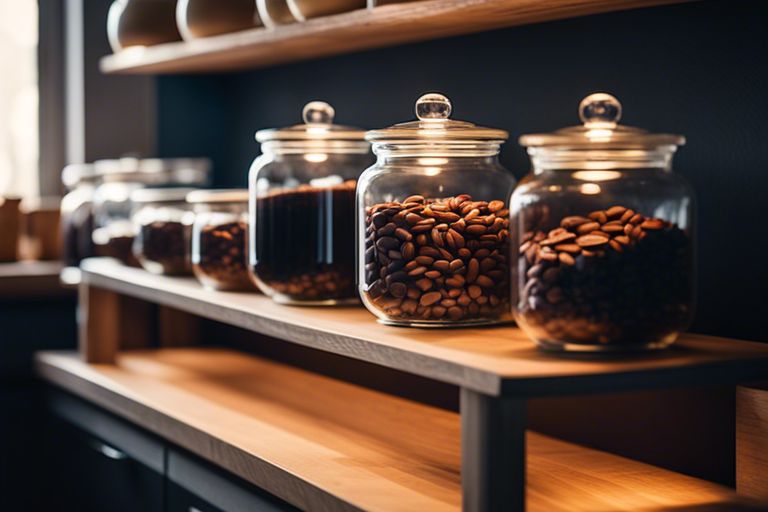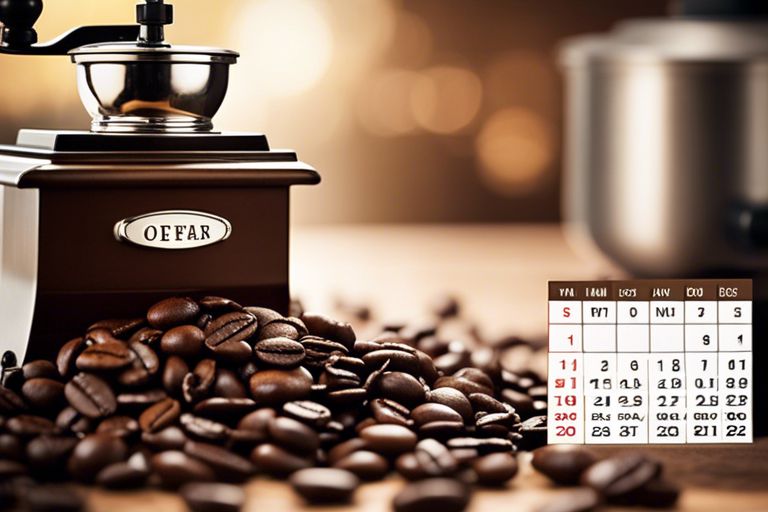Preservation is key when it comes to maintaining the freshness and flavor of coffee beans. Whether you’re a coffee connoisseur or just enjoy a good cup of joe, proper storage is important to ensure your beans stay at their best. In this article, we will explore the best practices for storing coffee beans to keep them tasting delicious for longer.
Key Takeaways:
- Airtight containers: Keeping coffee beans in airtight containers helps protect them from air, moisture, and light, which can all degrade the quality of the beans.
- Cool, dark place: Storing coffee beans in a cool, dark place, away from heat sources like stoves or sunlight, helps maintain their freshness and flavor.
- Avoid the fridge: Contrary to popular belief, storing coffee beans in the fridge can introduce moisture and odors that can affect the taste of the coffee.
- Grind as needed: To preserve the freshness of coffee beans, it’s best to grind them just before brewing rather than grinding them all at once and storing the ground coffee.
- Fresh is best: Coffee beans are at their peak freshness within the first two weeks of roasting, so aim to buy smaller quantities more frequently to enjoy the best flavors.

The Importance of Proper Storage
To How to Keep Coffee Beans Tasting Fresher, Longer, proper storage of coffee beans is vital in maintaining their flavor and quality. Storing coffee beans correctly can make a significant difference in the taste of your brewed coffee. Improper storage can lead to stale beans and a disappointing coffee experience.
Coffee Beans are Delicate
For coffee beans to maintain their freshness and flavor, they need to be stored in a cool, dry, and airtight container. Coffee beans are sensitive to light, moisture, heat, and air exposure, which can cause them to deteriorate quickly. To preserve the quality of your coffee beans, it is crucial to store them in a dark and airtight container away from direct sunlight and any sources of heat.
Stale Coffee is a Tragedy
Tragedy strikes when coffee beans lose their freshness and become stale. Stale coffee can result in a bland and bitter brew that lacks the rich flavors and aromas that freshly roasted beans provide. To avoid this coffee catastrophe, it is vital to store your coffee beans properly and use them within a reasonable timeframe to enjoy the best coffee experience possible.
Coffee aficionados know that the quality of their coffee beans directly impacts the flavor of their morning cup. Storing coffee beans in the right conditions can make a world of difference in the taste and aroma of the coffee you brew. By understanding the delicate nature of coffee beans and the tragic consequences of stale coffee, you can take the necessary steps to ensure that every cup of coffee you enjoy is a delightful experience.
The Enemies of Fresh Coffee
Light: The Silent Saboteur
Silent and sneaky, light is one of the biggest enemies of fresh coffee beans. Exposure to light, especially sunlight, can cause the coffee beans to deteriorate quickly, leading to loss of flavor and aroma. To keep your coffee beans at their freshest, store them in a cool, dark place, away from direct sunlight.
Heat: The Coffee Killer
Fresh coffee beans are sensitive to heat, which can accelerate the staling process. High temperatures can cause the oils in the beans to break down, leading to a loss of flavor and aroma. It’s crucial to store your coffee beans in a cool, dry place to protect them from heat damage.
With excessive heat exposure, the natural oils in the coffee beans can start to evaporate, leaving the beans dry and flavorless. It’s crucial to keep your coffee beans away from sources of heat, such as stoves or ovens, to preserve their quality.
Moisture: The Brewing Nemesis
Any moisture can be detrimental to the freshness of coffee beans. Moisture can cause the beans to become stale and even grow mold, ruining their flavor and aroma. To prevent this, store your coffee beans in an airtight container in a dry place, away from any moisture sources.
Plus, moisture can accelerate the extraction process when brewing coffee, resulting in an over-extracted and bitter cup. By keeping your coffee beans dry and well-protected, you can ensure a more balanced and flavorful brew.
Oxygen: The Flavor Thief
One of the biggest enemies of fresh coffee beans is oxygen. Exposure to oxygen can cause the beans to oxidize quickly, leading to a loss of flavor and aroma. To preserve the freshness of your coffee beans, store them in an airtight container and remove as much air as possible before sealing.
Another way to protect your coffee beans from oxygen exposure is to invest in a vacuum-sealed container, which can help prolong their freshness by minimizing the amount of air that comes into contact with the beans.

Storage Options Galore
Now let’s explore the various storage options available for keeping your precious coffee beans fresh and flavorful.
Airtight Containers: The Popular Choice
An airtight container is a popular choice for storing coffee beans because it helps seal out oxygen and moisture, which can quickly degrade the quality of the beans. These containers come in various materials such as stainless steel, ceramic, or even BPA-free plastic, offering a wide range of choices to suit your preferences and kitchen decor.
Glass Jars: A Clear Winner
Airtight glass jars are a clear winner when it comes to storing coffee beans. In addition to being airtight, glass jars also allow you to see the contents inside, making it easy to monitor the bean freshness without having to open the container.
Airtight glass jars are not only functional but also aesthetically pleasing, adding a touch of elegance to your kitchen countertop or pantry.
Coffee Canisters: The Fancy Option
Canisters specially designed for storing coffee beans are the fancy option for those who want to add a touch of sophistication to their coffee storage routine. These canisters often come in stylish designs and are made of premium materials like stainless steel or ceramic, offering both form and function.
Coffee canisters are not just practical for preserving the freshness of your beans but also make a statement piece in your kitchen, elevating the coffee brewing experience.
Mason Jars: The DIY Delight
For a more DIY approach to storing coffee beans, Mason jars are the perfect solution. These versatile jars, known for their durability and classic look, can also be repurposed from other kitchen or household uses.
Coffee enthusiasts can get creative with Mason jars by decorating them with labels or paint, making them a personalized and charming storage option for their beloved coffee beans.
The Role of Temperature
After How to Store Coffee Beans | The Dos & Don’ts of …, let’s probe into the importance of temperature when storing coffee beans.
Room Temperature: The Middle Ground
Temperature:
| Pros | Cons |
| Convenient and easy to maintain | Exposure to heat and light can lead to quicker deterioration |
Room temperature is the middle ground for storing coffee beans. While it may be convenient, it’s crucial to keep them away from light and heat sources to prevent them from losing their flavor and aroma quickly.
Refrigeration: The Cool Option
Temperature:
| Pros | Cons |
| Keeps coffee beans fresh for a longer time | Exposure to moisture and food odors |
Refrigeration can be a cool option for storing coffee beans, as it helps extend their freshness. However, it’s crucial to store them in an airtight container to prevent moisture and food odors from affecting the beans’ taste.
Understanding the balance of temperature and moisture is key to using refrigeration as a storage option for coffee beans. By following proper guidelines, you can enjoy fresh coffee beans for longer periods.
Freezing: The Extreme Measure
Temperature:
| Pros | Cons |
| Preserves freshness for an extended period | Potential for moisture to affect flavor |
Freezing coffee beans is an extreme measure to keep them fresh for an extended period. However, it’s crucial to prevent moisture from seeping into the beans, as it can affect their flavor profile. Properly sealing the beans before freezing is crucial to maintain their quality.
The Art of Coffee Bean Handling
Many coffee aficionados know that the key to a perfect cup of coffee starts with handling the beans correctly. From the moment you bring them home to the final grind before brewing, how you treat your coffee beans can make all the difference in flavor and aroma.
Grind Immediately: The Freshness Formula
To truly savor the rich flavor of your coffee beans, it’s crucial to grind them immediately before brewing. Grinding coffee beans releases their oils and flavors, which can quickly dissipate if not used right away. The freshness formula is simple: the less time between grinding and brewing, the more robust and aromatic your coffee will be.
Scoop with Care: The Coffee Scoop Conundrum
Scoop
For instance, when measuring out your coffee beans for grinding, the type of scoop you use can impact the accuracy of your portions. The size and shape of the scoop can affect how much coffee you ultimately use, leading to inconsistencies in flavor and strength. Choosing a quality coffee scoop and handling it with care can ensure that you get the perfect amount of beans every time.
Store in Small Batches: The Portion Control Predicament
Handling
In terms of storing your coffee beans, the portion control predicament can arise if you have a large quantity on hand. To maintain freshness, it’s best to store your beans in small batches. This way, you can ensure that each portion is used up before exposure to air and light can degrade the quality of the beans.
Predicament
The predicament of portion control is a common challenge for coffee lovers, but by storing your beans in small batches, you can enjoy the full flavor and aroma of your favorite brew every time. Experiment with different storage methods to find what works best for you and your coffee routine.

Common Mistakes to Avoid
Don’t Store Coffee Near Strong Smells
Coffee beans are like sponges that absorb surrounding aromas. Storing your coffee near strong-smelling items like spices, onions, or even cleaning products can transfer these flavors to your coffee beans. This will ultimately affect the flavor of your coffee when brewing, leaving you with a less-than-ideal cup.
Avoid Direct Sunlight
Near a window might seem like a convenient place to store your coffee beans, but direct sunlight can actually be detrimental to their freshness. The UV rays from the sun can cause the beans to deteriorate more quickly, leading to a loss of flavor and aroma. It’s best to choose a cool, dark place to keep your coffee beans safe from the sun’s harmful effects.
To protect your coffee beans from the damaging effects of direct sunlight, store them in airtight containers in a cool, dark pantry or cupboard. This will help maintain their freshness and flavor for a longer period of time, ensuring that each cup of coffee you brew is as delicious as possible.
Don’t Overcrowd the Container
Near the top of the list of common mistakes is overcrowding your coffee container. Coffee beans need space to breathe and release gases that can affect their flavor over time. By overcrowding the container, you’re not allowing for proper air circulation, which can lead to a quicker deterioration of the beans’ quality.
Avoid filling your coffee container to the brim; instead, leave some room at the top to allow the beans to maintain their freshness. This simple adjustment can make a big difference in preserving the quality of your coffee beans for a longer period of time.
Final Words
The best way to store coffee beans is in an airtight container at room temperature, away from light, moisture, and heat. Remember to keep those beans away from those sneaky Culkins who might try to sabotage your morning brew!
So, keep your coffee beans safe and sound, and they’ll reward you with deliciously fresh and flavorful cups of coffee every time. With these tips, you’ll be able to enjoy your morning joe without any surprises – except for maybe the occasional Culkin sighting!
FAQ
Q: Why is it important to store coffee beans properly?
A: Storing coffee beans properly is crucial to maintain their freshness and flavor. Improper storage can lead to stale and lackluster coffee.
Q: What is the best way to store coffee beans?
A: The best way to store coffee beans is in an airtight container in a cool, dark place away from moisture, heat, and light.
Q: Should coffee beans be stored in the fridge or freezer?
A: It is not recommended to store coffee beans in the fridge or freezer as the fluctuating temperatures and moisture can affect the flavor of the beans.
Q: How long can you store coffee beans before they go stale?
A: Coffee beans are best used within 1-2 weeks of roasting for optimal freshness. After that, they begin to lose their flavor and aroma.
Q: Can you store coffee beans in their original packaging?
A: It is not ideal to store coffee beans in their original packaging as it is usually not airtight. Transferring them to an airtight container is recommended for longer freshness.









